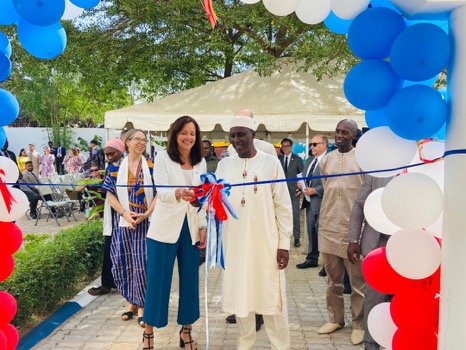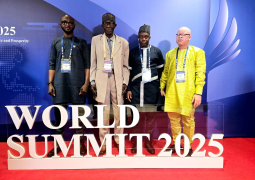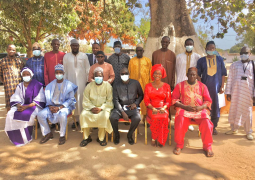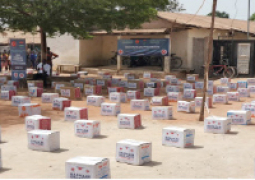
Initiated in 1961 by former United States President J.F. Kennedy, Peace Corps remains committed to its founding mission of promoting world peace and friendship among all countries that it volunteers served.
At the inauguration, Siiri Morley, Peace Corps the Gambia County Director, reminded that Peace Corps comprises of people with different backgrounds, who have been brought together in the spirit of promoting world peace and friendship.
“What we do and how profound our interpersonal connections can be in promoting world peace and friendship. Just last week, I'm comforted in thinking about how we are showing up to honor each other's cultures and national identities. Instead of engaging with people from across the world in a way that is extractive, we are connecting around our shared humanity and our shared goals.”
She maintained that their work is to advance world peace and friendship one person at a time, reminding that one volunteer speaking a national language, learning to listen more than they speak, and honoring other perspectives before acting.
“We've been working here in The Gambia since 1967 to focus on locally prioritized projects identified in partnership with the Gambian government. After a two-year pause during COVID-19, we've reopened and are stronger than ever. Today, we have 40 volunteers serving in the country, and we just welcomed our sixth group of volunteers back since reopening.”
Peace Corps Country director noted that they’ve reached over 60,000 individuals in programmes that these volunteers have co-led with their counterparts in their communities in less than three years since we reopened.
“Since our founding in The Gambia, we've been honored to have 2,032 volunteers to serve here. These volunteers have worked in 413 different communities throughout the country, learning the language and culture of the Fula, Wolof, Mandinka, Jola, and Sarahule communities, many of them learning multiple languages at once. We've had a total of 706 volunteers working in education, 773 in agriculture, and 553 in health.” he stated.
For his part, Baboucarr Boye, Minister of Public Service and Administration Reforms Policy, expressed delight that over the long-standing partnership.
“Our Ministries of Basic and Secondary Education, Health, Agriculture, Environment, and Youth and Sports have all enjoyed the partnership and support of the U.S. Peace Corps. Peace Corps, as was said earlier, is responsive to our requests and priorities.”
Minister Boye revealed that they’ve developed strategic plans together to ensure that their work supports our existing priorities.
“We are incredibly proud of our accomplishments that we have made together. Because of the work of the Peace Corps in the Gambia and their involvement in issues of early literacy and numeracy, a partnership was established between these two organizations called Effective Intervention and the Peace Corps Office.”
Peace Corps Global Director, Carol Spahn, highlighted that this is a space where volunteers, Peace Corps staff, and partners will be spending time dreaming about and acting on locally prioritized projects.
“It is an honor to open this building officially with all of you today. In partnership with the Gambian government, the ministries of agriculture, environment, health, and basic and secondary education, we are also proud to have the volunteers here in the Gambia work on initiatives around agricultural resilience in a time with ever-changing weather patterns.”
“I know that the volunteers who serve here in The Gambia may represent the United States in places like Mongolia, El Salvador, Malawi, years from now. So when we say that part of our goal is bringing The Gambia back to the United States, it is also bringing that spirit of The Gambia to countries around the world where volunteers will go on to live and serve.”
Mr Eric Mehler, United States Charge D’Affairs in The Gambia, said Peace Corps has signified and facilitated true understanding and friendship between the people of The Gambia and the United States since 1967.
The ceremony also witnessed volunteers sharing their experiences in their various regions especially in The Gambian local languages namely; Mandinka, Wolof, Fula and Sarahule.
Read Other Articles In National News
Stakeholders poise to strengthen apprenticeship systems in Africa
Mar 16, 2023, 11:59 AM




